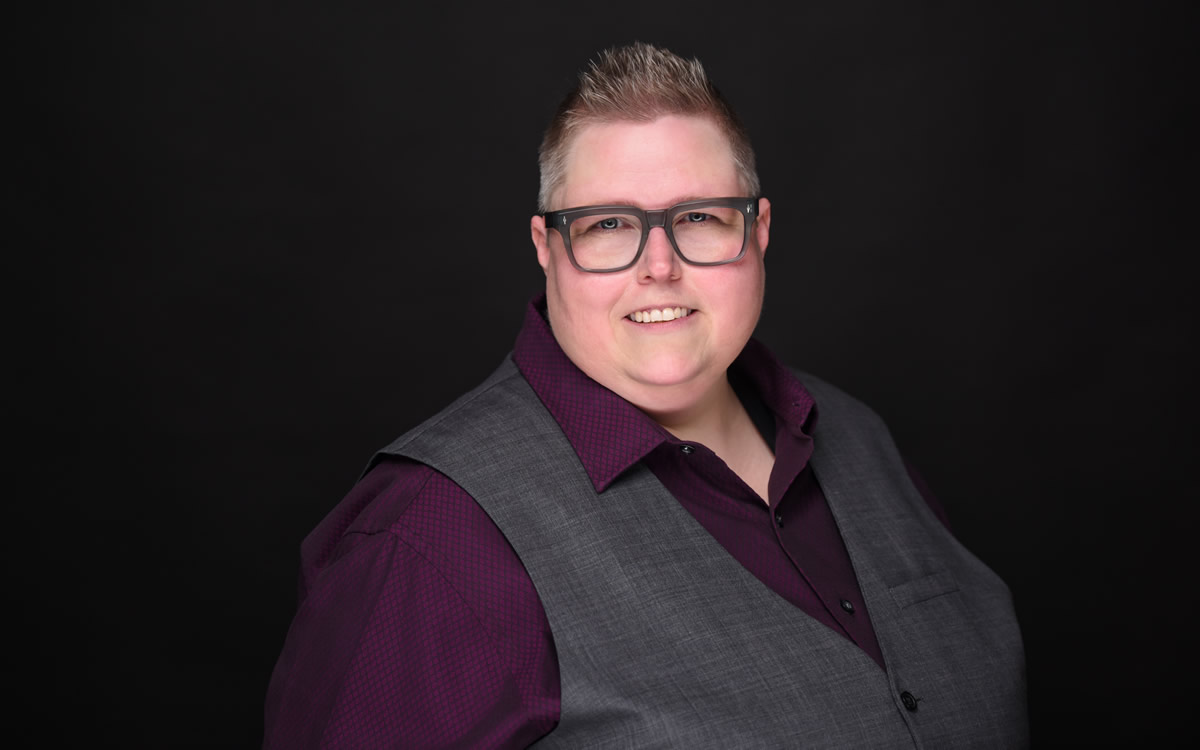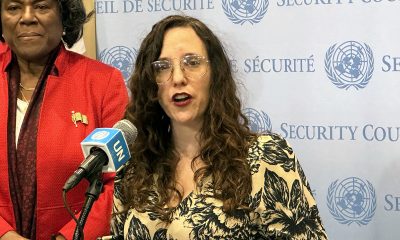LGBTQ Non-Profit Organizations
OutRight Action International announces new executive director
Maria Sjödin to succeed Jessica Stern

OutRight Action International on Thursday announced it has named Maria Sjödin as its next executive director.
Sjödin was executive director of RSFL, the largest LGBTQ and intersex rights organization in Sweden, from 2005-2014. Sjödin had been OutRight Action International’s acting executive director since last September.
They will succeed Jessica Stern, who President Joe Biden in June 2021 named as special U.S. envoy for the promotion of LGBTQ and intersex rights abroad.
“I’m super honored and couldn’t be more excited to carry on the work that we’re doing at OutRight at the moment,” Sjödin told the Washington Blade on Wednesday during an exclusive interview. “I’m super grateful and extremely happy.”
Julie Dorf, who is now a senior advisor for the Center for Global Equality, founded the group that is now OutRight Action International in 1990.
Sjödin noted OutRight Action International, which has staff in 12 countries and works with advocacy groups in many others, is the world’s largest LGBTQ and intersex rights organization. OutRight Action International is the only LGBTQ- and intersex-specific organization with a permanent presence at the U.N.
OutRight Action International earlier this year launched LBQ Connect, a program that seeks to bolster the work of activists who identify as lesbian, bisexual or queer women. Sjödin said they plan to continue this initiative as executive director.
“Over the length of my activism, I have often heard LGBTQ women say, you know, we feel invisible, we’re not seen, and we don’t have enough resources,” they told the Blade. “And LBQ connect, has been developed in response to that.”
Sjödin said there “has been an enormous progress in a lot of different countries” over the more than two decades they have been in the LGBTQ and intersex rights movement. Sjödin also acknowledged “there’s still a very long way to go.”
“It takes a long time to create the type of change that we need to see,” they said. “There’s a significant pushback from those who don’t believe that we should have rights.”
Sjödin in response to the Blade’s question about the challenges that LGBTQ and intersex people continue to face said anti-transgender rhetoric has “spread as a wildfire.” They also cited the legacy of colonial-era laws that criminalized LGBTQ and intersex people and the reaction to the monkeypox outbreak.
“It starts with the fact that the colonial powers put in place laws around the world that criminalize primarily same sex relations, but in many other cases there are restrictions on gender expressions and gender identities … there is a long history of homophobia and transphobia,” said Sjödin. “We see it right now with the outbreak of monkeypox. As soon as we heard about the first cases of monkeypox, we knew that okay, soon the leaders are going to come out and blame LGBTIQ people. And just like that it happens again.”
“LGBTIQ people and LGBTIQ communities get blamed for all kinds of things and are used as scapegoats when leaders want to, often I guess, divert attention from their own failings and just push the idea that somehow LGBITQ people are to blame,” they added.
Sjödin also said “some people seem to think that progress is kind of linear and … things that we can take for granted now are things that we can always take for granted.”
They spoke with the Blade less than two months after the U.S. Supreme Court struck down Roe v. Wade.
Justice Clarence Thomas in his concurrent opinion said the Supreme Court should reconsider the decisions in the Obergefell and Lawrence cases that extended marriage equality to same-sex couples and the right to private, consensual sex.
“There can be enormous and very dangerous rollback of rights that had already been won,” said Sjödin.
Sjödin in response to the Blade’s question about the Biden administration’s support of LGBTQ and intersex rights around the world stressed it “is critical that governments take a stand and promote human rights for LGBTIQ people around the world.”
“The U.S. has an outsized influence on the world, so when it’s on the agenda of the administration it does make a big difference,” said Sjödin.
LGBTQ Non-Profit Organizations
Evan Low named next LGBTQ+ Victory Fund president
Former Calif. lawmaker to succeed Annise Parker

The LGBTQ+ Victory Fund and LGBTQ+ Victory Institute have named gay former California state Rep. Evan Low to serve as its next president and CEO, the groups announced on Tuesday.
“Today, we face an existential crisis,” he said. “The LGBTQ+ community, along with other historically excluded communities, are being systematically legislated out of existence.”
He added, “I am committed to ensuring our voices are not just included, but impossible to ignore—and represented at the highest levels of office.”
Low will succeed former Houston Mayor Annise Parker, who announced in February 2024 that she would step down after leading the organizations since 2017.
The Victory Fund works to increase the number of LGBTQ elected officials serving in all levels of government and “has helped thousands of LGBTQ+ candidates win local, state, and federal elections.” The Victory Institute works to ensure “the success of our LGBTQ+ elected and appointed officials at all levels of government.”
Before his election to the California State Assembly, where he served from 2014-2024, Low was the first Asian American to serve on the Campbell City Council, going on to lead the city as the country’s youngest openly LGBTQ mayor.
In the state legislature, Low “led groundbreaking efforts in marriage equality, LGBTQ+ rights, and economic opportunity,” the Victory Fund said in a press release.
“His leadership and service have been widely recognized, earning him multiple ‘Legislator of the Year’ honors and a proclamation of ‘Evan Low Day’ from then-San Francisco Mayor Gavin Newsom.”
LGBTQ Non-Profit Organizations
Blade to cover Creating Change conference in Las Vegas
National LGBTQ Task Force convenes movement leaders at a pivotal moment

The Washington Blade will be in Las Vegas this week to cover the National LGBTQ Task Force’s flagship annual Creating Change conference, Jan. 21-26, where movement leaders will convene at a pivotal moment for LGBTQ rights.
More than 3,000 are registered to attend, nearly a third of whom identify as transgender or gender nonconforming, and more than half as people of color. A livestream of the plenary sessions is available here.
This year’s conference comes days after the inauguration of President Donald Trump, along with his administration’s issuance of executive orders targeting immigration and LGBTQ rights, together with the revocation of his predecessor’s executive actions that established and clarified rights and protections for these and other marginalized communities.
For instance, Trump on Monday signed an order to direct the federal government to recognize only two genders, based on birth sex, which will likely mean that U.S. citizens will no longer be able to select the “X” gender marker for their passports and official documents, though the U.S. State Department has not provided clarity on how that will be enforced.
In recognition of the shifting legal and regulatory landscape — and the need for immigrant and trans or gender nonconforming communities to understand and prepare for changes in the coming weeks and months — the Task Force this year has organized sessions like “Protecting Your Rights: Navigating Legal Systems” with attorneys from the Transgender Law Center, the National Center for Lesbian Rights, and Oasis Legal Services.
Along with covering breaking news from sessions during the four-day program, the Blade will be talking with experts for stories focused on the backlash against diversity, equity, and inclusion initiatives, the Trump administration’s expected ban on military service by trans people, insights into how major LGBTQ advocacy organizations are preparing to push back against actions by this White House and congressional Republicans, and more.
LGBTQ Non-Profit Organizations
Gov. Tim Walz to headline HRC National Dinner
Tickets still available for event on Saturday

Minnesota governor and Democratic vice presidential nominee Tim Walz will be the keynote speaker at the Human Rights Campaign National Dinner on Saturday, the organization announced on X.
BIG NEWS: We are thrilled to have Vice Presidential Nominee Governor Tim Walz join us at our National Dinner! He has been a steadfast champion for the LGBTQ+ community and will continue fighting for our rights once he is elected to the White House. pic.twitter.com/nRsZfzuMYg
— HRC 🥥🌴 (@HRC) September 4, 2024
Tickets are still available for the event. HRC is also hosting an Equality Convention this week, “a destination for trailblazers in politics, culture, and business who are igniting change and driving LGBTQ+ equality forward.”
When Vice President Kamala Harris, the Democratic 2024 presidential nominee, announced Walz as her running mate on Aug. 6, HRC President Kelley Robinson said her pick “sends a message that a Harris-Walz Administration will be committed to advancing equality and justice for all.”
The group wrote in a press release: “Governor Walz is a career-long champion for LGBTQ+ people. In 1999, as a history teacher and football coach, Walz sponsored the school’s first gay straight alliance student group.
“He opposed efforts to ban same-sex marriage in the Minnesota Constitution. While serving in Congress, he co-sponsored legislation to repeal the Defense of Marriage Act (DOMA), voted to repeal the discriminatory ‘Don’t Ask, Don’t Tell’ law, voted for the Matthew Shepard/James Byrd Jr. Hate Crimes Prevention Act and introduced legislation to protect LGBTQ+ service members from discrimination in benefits.
“As Governor, Tim Walz signed an Executive Order banning the dangerous practice of ‘conversion therapy’ in Minnesota.”
HRC in May pledged $15 million to organize in key battleground states for the Democratic ticket. Just days after President Joe Biden stepped out of the race and backed Harris as the presumptive nominee, the group raised more than $300,000 for her campaign in a virtual fundraiser.
-

 Hungary4 days ago
Hungary4 days agoUpwards of 100K people march in Budapest Pride
-

 U.S. Supreme Court10 hours ago
U.S. Supreme Court10 hours agoSupreme Court to consider bans on trans athletes in school sports
-

 Out & About11 hours ago
Out & About11 hours agoCelebrate the Fourth of July the gay way!
-

 Opinions3 days ago
Opinions3 days agoSupreme Court decision on opt outs for LGBTQ books in classrooms will likely accelerate censorship











